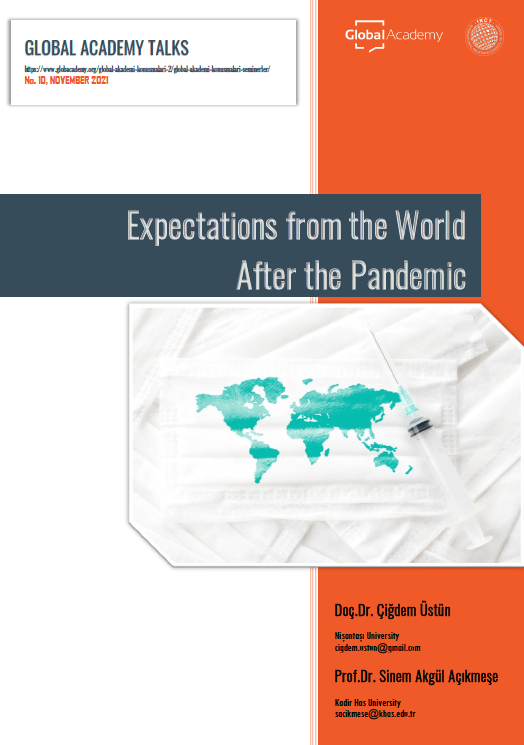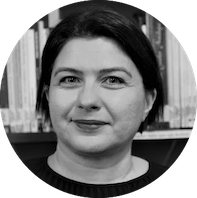
COVID-19 has profoundly affected the orderliness, priorities,and practices of individuals, societies, the public,and the international system. The working styles of individuals have changed, while home/remote working models have become widespread worldwide, especially for white-collar workers, and occupational health and safety issues have gained importance for individuals.The measures taken to protect the health of those living withinsocieties brought up the dilemma of the balance between freedoms and the public interest,andchanges in public administration were discussed. While the policies and practices that maintaindomestic order instates and the priorities in their foreign policies have changed; thus, it has been observed thatwhat is expectedfrom states hasincreased during the pandemic.It seems inevitable that these expectations will bring a change in the practices ofstates both towardtheir citizensdomesticallyand in their relations with other states abroad after the pandemic. It is expected from the post-pandemic world that security concerns will outweighexpectations of freedom, increase state intervention in individuals’ social and business lives and public policies, and put more emphasis on the concept of state sovereignty. Of course, the pandemic has not only affected individuals and the internal and external working mechanisms of the statebut has also deeply shakenthe system in which the maininternationalactors interact with each other. In this study, the effects of the pandemic at the level of the individual, the state,and the system,and the expectations for the future created by these effectsare discussed.

Çiğdem Üstün, Assoc. Dr., Nisantasi University
Çiğdem Üstün, graduated from Political Science and Public Administration Department at Bilkent University with honors and completed her MA Degree at European Studies and International Relations Department in University of East Anglia, UK with distinction. She holds a PhD in European Studies from the University of Limerick (Ireland) on Comparison of EU and Turkish Security Cultures. Her PhD thesis was published in 2010 by I.B. Tauris. She got her associate professorship in 2014 on EU Studies. Her research interests are European integration, enlargement, EU-Turkey relations, EU’s neighborhood policies. She is currently working as a faculty member in the Economic, Administrative and Social Sciences, Department of International Relations at Nişantaşı University, İstanbul. She has been visiting researcher and lecturer at University of Limerick, University of Catania and University of Cambridge. She is a member of International Relations Council of Turkey, Romanian Association for Baltic and Nordic Studies in Târgovi?te, Association for Development Migration and Social Policies and Women in Foreign Policy Initiative. She joined the editorial team of journal of International Relations (Uluslararası İlişkiler) as an associate editor in 2019. She has numerous articles, books and book chapters and opinion eds published in her areas of expertise; EU-Turkey relations, neighborhood policies and Turkish foreign policy. She worked in several EU funded projects under the Promotion of the Civil Society Dialogue Between EU and Turkey, Universities Grant Scheme, the 7th Framework Programme, the IPA Information and Communication Programme, Support for actions promoting a better-informed public debate about EU Enlargement, in a number of Sivil Düşün (Think Civil) Programme.

Sinem Akgül Açıkmeşe, Prof. Dr., Kadir Has University
Sinem Akgül Açıkmeşe is a Professor of International Relations and Jean Monnet Chair holder on Hybrid Threats in the EU at Kadir Has University (KHAS).She holds a BA in International Relations as well as an MA in European Union-International Relations from Ankara University. She studied at the European Institute of London School of Economics and Political Science (LSE) for her MSc degree in European Studies. She has completed her PhD in European Studies-International Relations at Ankara University (2008). She was a Jean Monnet fellow at LSE, Turkish Academy of Sciences fellow and visiting PhD student at London School of Economics, Sasakawa Young Leaders fellow, visiting scholar to IGCC-University of California-San Diego as a US Department of State Fellow, Black Sea Young Reformers fellow, visiting researcher at Stellenbosch University, visiting scholar at Harvard University (2017) in support of her research on Security Studies, EU foreign and neighbourhood policies specifically from a security perspective, European integration, enlargement and Turkey-EU relations. Prof. Açıkmeşe has a teaching experience of about 20 years, at various institutions including Ankara University and TOBB-University of Economics and Technology on a full-time capacity before she joined KHAS in 2011. She is currently the associate editor of European Review of International Studies,Governing Board Member as well as the Secretary-General of the International Relations Council of Turkey (IRCT) and served as a Member of the Governing Council of the International Studies Association (ISA) (2018-2020). She has coordinated and took part in several international research and exchange projects including EU-FP7 Marie-Curie Actions, Erasmus+ Strategic Partnerships and Jean Monnet Actions.

